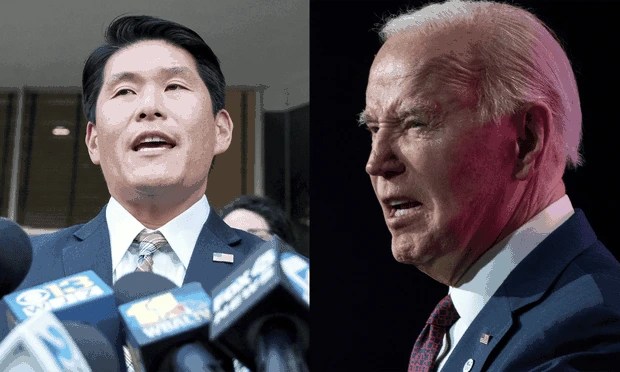Battle between the Department of Justice (DOJ) and the House Oversight Committee over the release of the audio recording of Special Counsel Robert Hur’s interview with President Joe Biden has intensified.
Despite mounting pressure from Representatives Jim Jordan and James Comer, the DOJ remains steadfast in its refusal to surrender the contentious recording, as reported by NTD on Saturday, April 27, 2024.
Assistant Attorney General Carlos Felipe Urates’ response to Representatives Jordan and Comer underscored the DOJ’s unwavering position.
Despite threats of contempt proceedings, the DOJ maintains that it has adequately addressed the committees’ concerns. Uriarte emphasized the department’s commitment to safeguarding sensitive law enforcement files, citing potential risks to ongoing investigations and the broader public interest.
Instead of the audio recording, the DOJ asserts that it has fulfilled the committees’ requests by providing Mr. Hur’s comprehensive report, testimony, and transcripts of the interview. This stance aligns with the department’s track record of cooperation with congressional inquiries, as noted by Uriarte.
Uriarte scrutinized the committees’ rationale for seeking the audio recording, highlighting the absence of a demonstrable congressional need. He refuted claims of potential revelations regarding President Biden’s alleged involvement in problematic foreign payments or retention of sensitive documents.
According to Uriarte, the transcripts already provided offer exhaustive insights, rendering the audio recording redundant. Moreover, he emphasized the sensitivity of law enforcement information, cautioning against its indiscriminate disclosure and warning of its impact on future cooperation with investigations.
The DOJ’s rebuke extends beyond the specific case, casting a broader spotlight on the parameters of congressional oversight. Uriarte decried what he perceived as congressional overreach and urged the committees to recalibrate their approach for effective governance.

Attorney General Merrick Garland cited privileges pertaining to national security as a central factor in withholding the audio recording. Amid inquiries into President Biden’s cognitive state, Garland reaffirmed his confidence in the president’s leadership in critical matters of foreign affairs and national security.
As the standoff persists, the clash between congressional oversight and executive authority underscores the delicate balance of power within the U.S. government. The DOJ’s steadfast refusal to yield underscores its commitment to upholding the integrity of law enforcement procedures, even under political pressure.
Moving forward, the resolution of this impasse will shape the contours of future interactions between the executive branch and congressional oversight committees, with far-reaching implications for governance and accountability.
�
�








